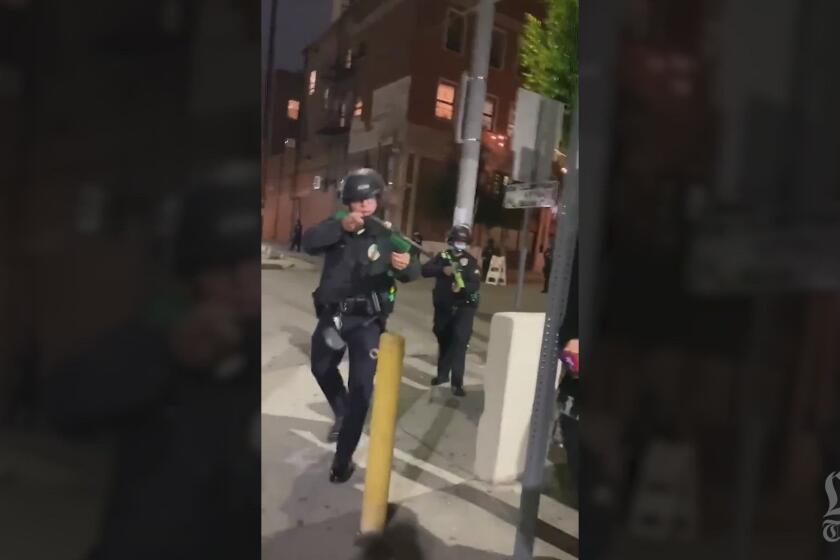Judge grants preliminary injunction limiting LAPD projectile weapons at protests
- Share via
A federal judge on Monday extended recent court restrictions on the Los Angeles Police Department’s use of hard-foam projectiles at protests, granting a preliminary injunction on the weapons that had been requested by protest groups suing the city.
U.S. District Judge Consuelo B. Marshall issued her ruling after finding that Black Lives Matter Los Angeles and other activists had successfully shown that they faced “irreparable harm” at future protests if the court did not intervene to restrict the weapons.
Her ruling largely keeps in place measures reining in the LAPD’s use of the weapons at street demonstrations that had previously been issued under a more temporary restraining order, which Marshall granted last month.
The restrictions will now remain in place for the duration of the underlying court case, in which BLMLA and other activists and protesters are suing the LAPD for its handling of last spring’s mass protests and its use of the weapons, which injured many demonstrators.
The ruling marked a substantial win for BLMLA, Los Angeles Community Action Network and the other plaintiffs, who have said their lawsuit was intended to force change.
After a judge revises her order, the LAPD says it will lift a week-old moratorium and return 37-millimeter projectile launchers to the field.
“We feel pretty good,” said Carol Sobel, an attorney for BLMLA and the other plaintiffs in the case, following Marshall’s ruling. “We feel it will be safer for people to go out and exercise their rights.”
Melina Abdullah, co-founder of BLMLA, said she also was pleased.
“It makes sense, and it’s encouraging the court decided this way,” she said.
Capt. Stacy Spell, an LAPD spokesman, said the LAPD “will comply with the court order.”
Marshall’s ruling restricts the use of 40-millimeter and 37-millimeter hard-foam projectile launchers to officers who are properly trained to use them. Reviews of last spring’s protests found that the weapons had been used by officers whose training was lacking.
Her ruling allows the LAPD to fire 37-millimeter projectiles — which are launched five at a time — at the ground in front of protesters after declaring a gathering unlawful and issuing a dispersal order, but forbids officers from targeting individuals with the weapons “unless absolutely necessary to prevent imminent serious bodily injury to the officer or others.”
It allows officers to target individuals with 40-millimeter rounds “only when the officer reasonably believes that a suspect is violently resisting arrest or poses an immediate threat of violence or physical harm,” and forbids officers from targeting the head, neck, face, eyes, kidneys, chest, groin or spine.
Marshall’s order says both weapons should only be fired from five feet or more, “unless an officer or other person is attacked and there is a threat of imminent serious harm.”
The injunction does not apply to beanbag projectiles that LAPD officers also use at protests, despite a recent request from the plaintiffs that the court consider restricting those weapons, as well.
Whether the restrictions will remain in place after the broader court case is adjudicated remains unclear.
The city and the department have argued that officers need such weapons to restore order, keep themselves safe and bring an end to dangerous situations, particularly when crowds have grown large and it is impossible to extract and arrest only those individuals who are committing violence.
Department officials have maintained that position in recent discussions with police overseers about the best path forward, and whether the weapons should be shelved entirely.
Past lawsuits over the LAPD’s handling of other mass demonstrations in L.A.’s past have been settled for millions of dollars and resulted in agreements by the city to reform policies around projectiles and batons at protests. The same could happen in this case, with the court making the temporary injunction a permanent one, but the court could also side with the city and undo the restrictions.
The ruling comes as the LAPD and the city of L.A. continue to be bombarded with lawsuits over the LAPD’s use of projectile weapons against protesters, both from last spring and from more recent protests.
The plaintiffs in the BLMLA case cited some of those more recent injuries in arguing that the LAPD’s claims of reform since the mass demonstrations of last spring have not brought an end to projectile abuses.
Protesters and others have alleged that LAPD projectiles have left them with severe bruises, welts and lacerations, but also far more serious injuries. One protester alleges his testicle was burst, another that his teeth were knocked out. Those injured include demonstrators, but also journalists.
In a lawsuit filed in state court last week, a man named William Gonzalez alleged he lost his right eye after being shot with a 40-millimeter projectile at a street celebration downtown following the Lakers’ championship win in October. His lawsuit alleges the LAPD cannot be trusted to follow its own guidelines for such weapons, including that they should not be aimed at people’s heads or faces.
“This is no better exemplified than in Plaintiff’s eye socket, which no longer contained an eye and rather the [40-millimeter] round and a pool of debris and blood where said eye used to be,” his lawsuit said.
The LAPD has said it is investigating Gonzalez’s claims.
City attorneys are meant to brief the Police Commission on Tuesday on more than a dozen cases.
The department and the commission are also set to continue a discussion on how best to implement a large number of reforms recommended in three reports on the LAPD’s handling of last spring’s demonstrations — one of which was cited extensively by Marshall in her granting of the injunction.
More to Read
Sign up for Essential California
The most important California stories and recommendations in your inbox every morning.
You may occasionally receive promotional content from the Los Angeles Times.















